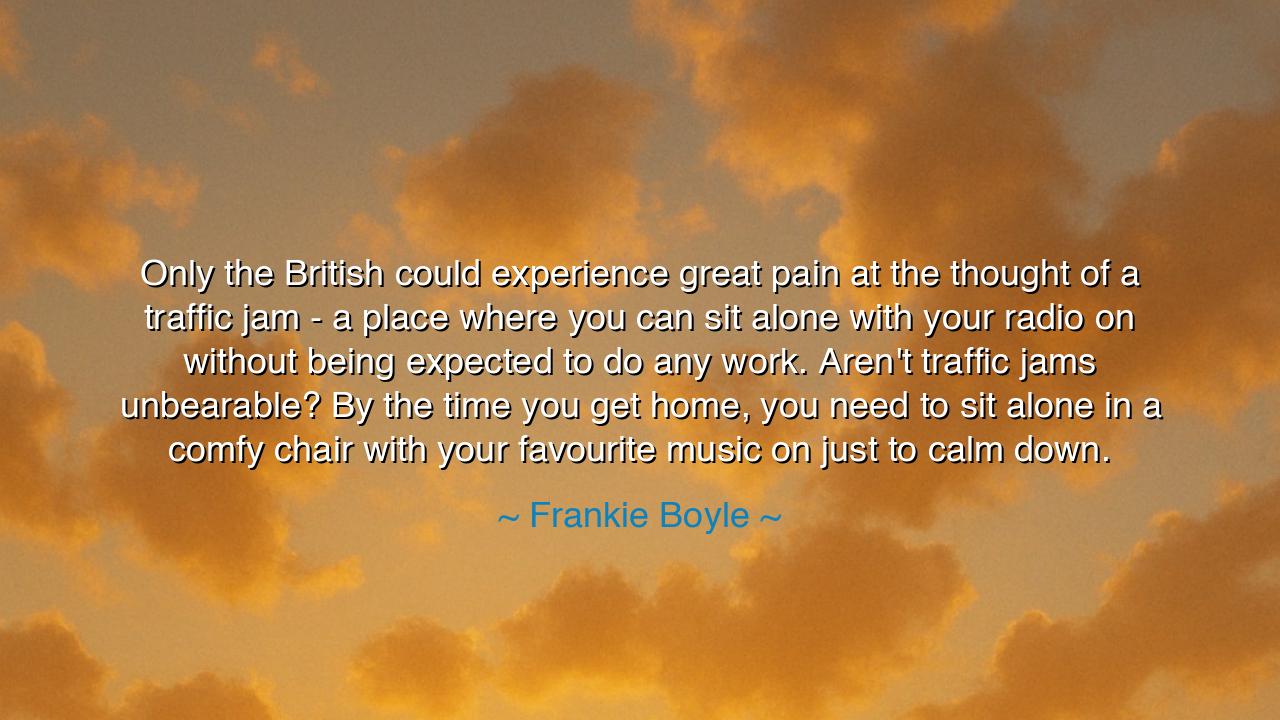
Only the British could experience great pain at the thought of a
Only the British could experience great pain at the thought of a traffic jam - a place where you can sit alone with your radio on without being expected to do any work. Aren't traffic jams unbearable? By the time you get home, you need to sit alone in a comfy chair with your favourite music on just to calm down.






In the sharp yet insightful words of Frankie Boyle, the jester-philosopher of our modern age, we hear a reflection not merely on traffic, but on the peculiar anguish of the human spirit: “Only the British could experience great pain at the thought of a traffic jam — a place where you can sit alone with your radio on without being expected to do any work. Aren’t traffic jams unbearable? By the time you get home, you need to sit alone in a comfy chair with your favourite music on just to calm down.” Beneath his biting humour lies a truth older than nations — that humanity, though surrounded by comfort and convenience, still suffers from restlessness, unable to sit still even when given the rare gift of pause.
Boyle, with his trademark irony, turns the mirror of comedy toward the human condition. The traffic jam, that mundane purgatory of modern life, becomes his stage. There we find ourselves — impatient, agitated, enslaved by time — resenting the very stillness we secretly crave. In ancient times, men feared the spear, the storm, the silence of the gods; now, we fear delay. We have made an idol of busyness, a cult of motion. We measure our worth not by wisdom or joy, but by how swiftly we move, how much we produce, how little we rest. Boyle’s jest is not mere mockery — it is prophecy disguised as laughter.
The British, he says, are pained by the stillness of the traffic jam — and perhaps he speaks for all of modern humanity. For here is the paradox: to be forced into solitude, even for an hour, feels like punishment. Yet what is a traffic jam, truly? It is an unexpected sabbath — a place where one may breathe, listen to music, think, or simply be. But our minds, trained to worship progress, cannot accept it. The moment the wheels stop turning, the spirit begins to panic. We sit surrounded by comfort — warmth, music, safety — and call it suffering.
The ancients would have laughed at our plight. The philosophers of Greece and Rome spoke of stillness as the source of strength. Seneca wrote that “to be everywhere is to be nowhere,” and Marcus Aurelius sought peace in the quiet chambers of his mind even amid the roar of empire. To them, solitude was not a trap, but a temple. They would have seen Boyle’s “traffic jam” as a chance to commune with thought, to reconcile with time. But modern man, burdened by speed, cannot find stillness without discomfort. The more he races, the more he fears to stop.
Consider the story of Henry David Thoreau, who withdrew from society to live beside the still waters of Walden Pond. There, he discovered that life’s fullness was not found in haste, but in simplicity. “I went to the woods,” he wrote, “because I wished to live deliberately.” Yet today, such a choice would seem strange, even wasteful. To sit quietly, to listen to nature, to dwell in thought — these are now acts of rebellion. And so, Boyle’s humour becomes lament: a people so enslaved by motion that they cannot enjoy the very rest their ancestors sought for centuries.
From this, a profound lesson emerges: that rest is not idleness, and stillness is not waste. When Boyle speaks of the agony of sitting alone with the radio, he exposes how far we have strayed from ourselves. We no longer know how to inhabit a moment unless it is filled with purpose or distraction. Yet to reclaim the art of stillness is to reclaim our humanity. The one who can sit in silence without fear possesses the greatest freedom of all — the freedom from the tyranny of endless doing.
Therefore, my child, learn this wisdom hidden in jest: do not curse the traffic jam, nor the pause, nor the waiting. They are mirrors held before your soul. When the world halts your progress, see it as an invitation — to think, to breathe, to remember who you are. Turn your gaze from the clock to the horizon; from frustration to wonder. For in that stillness, you may find what no constant motion can give — peace.
And so, let Frankie Boyle’s irony become your teaching: that the greatest discomfort of modern life is not the loss of time, but the loss of presence. Learn to find joy in the spaces between destinations. When life slows you down, do not rage — listen. The silence you flee from may yet be the song of your own awakening.






AAdministratorAdministrator
Welcome, honored guests. Please leave a comment, we will respond soon